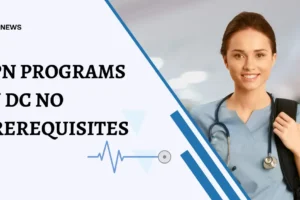Getting a bachelor’s degree is hard work. It needs time, money, & dedication. You can opt for the best online degree programs for working adults. It could get you a degree faster while keeping your job.
Table of Contents
Half of students under 23 earn their bachelor’s in 45 months or less, according to the National Center for Education Statistics. But if you are 30 or older, it takes around 162 months.
Many schools make online programs that move faster. These help working adults earn a bachelor’s in less than four years. They use shorter class terms and let you transfer more credits.
In this article, we will explore some of the best online degree programs for working adults. Let’s get started.
Key Takeaways
- You can learn anytime and anywhere that works for you, with options for pre-recorded lectures or live sessions.
- Some programs allow you to complete your degree quicker. This potentially leads to a promotion or job change sooner.
- You may be able to earn college credit for work or life experiences, saving you time and money.
- Exams like CLEP can allow you to earn credit for certain classes and finish your degree faster.
- There are online degree programs available in many different fields, so you can find one that fits your interests and career goals.
- There are financial aid options available for working adults, including grants, scholarships, and loans.
- Online degree programs are designed for busy adults who cannot quit their jobs to go back to school.
- You can complete coursework whenever you have free time.
- Many online programs offer accredited degrees that are just as valuable as traditional degrees.
- You will meet other working adults who are in the same boat as you, which can help find new jobs and feel supported.
How To Earn Best Online Degree Programs for Working Adults?
As a busy adult, you have many options to get your degree. It can be convenient to pick courses that fit your schedule. Let’s see how to do it:
1. Online Courses
You can earn your degree fully online. This allows you to take classes anytime and anywhere that works for you. Some universities offer pre-recorded lectures you can watch. Others require you to log in at set times.
2. Self-Paced Degree Programs
If you want to graduate quickly, consider a self-paced program. These are also known as accelerated online degree programs for working adults. These let you complete as much coursework as you can within a timeframe. Many charge a flat tuition fee, so you pay less if you finish faster.
3. Credit for Prior Learning
You may earn college credits for knowledge from work or life experiences. The credits allowed depending on your school and degree. Common examples are independent study, volunteering, and job training programs. Your prior learning must relate to your chosen degree.
4. Skip Some Classes with College Tests
One way to avoid taking certain required courses is to take and pass special tests called College Level Examination Program (CLEP) exams. By doing well on these exams, you can earn college credits and finish your degree faster.
An organization called the College Board manages these CLEP tests. They offer tests in 34 different subject areas. Almost 3,000 colleges and universities will accept passing CLEP scores and give you credits for those classes.
List of Best Online Degree Program Colleges for Working Adults
Here are some of the best online degree program colleges for working adults. Please check the admission criteria before applying to these online colleges. Let’s have a look at them:
Best Online Degree Programs for Working Adults
Here are some of the best online degree programs for working adults. Let’s have a look at them:
1. Business Administration
A Business Administration course teaches skills to make better decisions. It gives a clear view of problems in management. It provides tools to examine and judge diverse management issues.
Studying Business Administration prepares you well for careers in business and management fields.
Some jobs for graduates with a Business Administration degree include business consultant, market research analyst, human resource specialist, event planner, training and development specialist, loan officer, and marketing executive.
2. Criminal Justice
People who study Criminal Justice learn about jobs in the police, courts, prisons, and community safety. They may work as police officers, prison guards, or special agents. This degree helps you understand how to keep people safe.
Threats to public safety are always changing. There are new crimes like terrorism and cybercrime. That is why we need more trained people in Criminal Justice. The field keeps growing to deal with complex criminal issues.
In this program, you learn about important topics. For example, how to sentence criminals fairly. You also learn about the duties of police officers. You study how law enforcement, the government, and courts all work together.
3. Finance
Money management opens doors for building wealth for many people. Finance studies cover accounting, investing, and risk assessment. You will advise people or companies on money matters like smart investing for top returns. Your role examines finances to avoid risks and prepare for market shifts.
As a financial analyst, advisor, investment banker, or fund manager, you hold great responsibility. You will manage finances, track markets, and use business math skills.
Finance empowers you to create and protect wealth. Studying investments, accounting, and risk opens opportunities for you to guide your clients or organizations. You will analyze markets, minimize dangers, and maximize gains for your clients and organizations.
4. Healthcare Administration
As more people get older, there is a rising need for healthcare workers. A Healthcare Administration Degree teaches you about the human body, medical ethics, business skills, planning, computers, and leadership. With this training, you can work in many places that need healthcare workers.
Because healthcare is important, jobs are available in hospitals, doctor’s offices, nursing homes, home care services, and government or non-profit groups. Healthcare administrators do varied tasks. Their work helps their workplace and community in meaningful ways.
Learning healthcare administration prepares you for careers where you can aid others. The aging population means this field will continue growing. Students study anatomy, ethics, management, technology, and leadership skills.
5. Legal Studies
Are laws and the justice system fascinating to you? Do you want to learn about how laws are made and enforced? If yes, then Legal Studies could be the major for you.
This degree program provides an overview of the legislative process that creates laws and the judicial system that enforces them. After graduating, your role could involve influencing laws or supporting lawyers and courts. You might work in politics to drive change or in legal roles like paralegal or court clerk.
With this degree, you can continue to law school or start working in areas like lobbying, paralegal work, or court administration. You will be able to specialize in your preferred legal field. Regardless of your chosen profession, individuals with legal knowledge will always be in high demand.
6. Management
Management is an important field that helps you look at things from many angles. Its role is to use company resources well to achieve goals. These resources could be people, money, or tools and technology.
Being a good manager means thinking creatively and responsibly. You ensure employees work in the right roles and have what they need. You support your team and take care of company resources responsibly.
To prepare for this, you will likely study accounting, finance, leadership, teamwork, communication, and marketing. These areas matter in many management jobs after graduating.
7. Psychology
Do you ever wonder why people act the way they do? Or what makes someone behave in certain ways? If you find those questions interesting, you might enjoy studying in a Psychology school. Psychology is the study of the human mind and behavior.
Students who major in Psychology learn about human development. They study cognitive and behavioral disorders. They also learn research methods and counseling practices. With this degree, you could pursue a master’s program to become a licensed psychologist. Or you could apply what you learned to the business world.
Many psychologists work as consultants or employees for companies’ marketing teams. As a Psychology major, you could gain insights into why people make decisions. You could learn ethical ways to influence them. You could also help companies communicate better with their customers. Please remember that studying the human mind is useful in almost every industry.
8. Supply Chain Management
You can build important career skills in this degree. It gives you a broader view of global supply chains. You develop tools to manage them in smart and thoughtful ways.
The program covers new technologies and updates in the supply chain industry. It teaches about the latest innovations in global logistics.
You learn about blockchain, artificial intelligence, big data, and automation. The degree looks at issues like reducing risks, being sustainable, and making ethical choices. It gives insight into important supply chain topics.
9. Computer Science
Do you want to work with the hardware or software of computers? When you earn an online computer science degree, you will learn about both. This helps you understand the entire industry. Then you can work well with other businesses and departments.
With your degree, you could become a hardware engineer, app programmer, web developer, video game designer, or electronic music creator. You might work for a big company designing computer systems, networks, or business software. Or you might work for an app or game company making the next hit product.
Another option is freelancing, where you build mobile apps or websites. You could also be a consultant, helping small companies upgrade their computer systems, servers, and networks. Since technology is so important nowadays, there are many job opportunities for computer science graduates.
10. Liberal Arts
Learning Liberal Arts is interesting. It lets you study arts, humanities, and skills like analysis and communication. Some subjects are languages, literature, philosophy, music, art, history, geography, sociology, religion, and political science.
In this degree, you will learn about many topics. These include personal ethics, cultures, history, and the environment. You will gain new viewpoints on these important areas.
With a Liberal Arts degree, you can have careers like editor, journalist, writer, legislative assistant, or librarian. Since you study many subjects, you will have many job choices.
11. Accounting
Numbers and analysis are fun for some students. They want to help people make good money choices. Accounting is about studying money activities. It is used to make business decisions. It involves planning and looking at information.
Accounting also means learning how to measure, process, examine, and share money details about a company. This info goes to different people. It helps the company get better.
With an accounting degree, you could get a job analyzing data, running a business, being a manager, giving advice about business, working at a bank, advising about money, or studying the economy.
12. Marketing
Marketing is a great field if you enjoy talking with people and creating new ideas. With strong speaking skills, you can convince others to try products. As a marketer, you will learn math and numbers to study data.
You will plan ways to get more customers. Looking at businesses from all angles helps marketers understand buyers. Examining the customer experience is key for marketers to attract new people to a company’s products or services.
Strategic planning and making advertisements are important marketer duties. Analyzing statistical data allows marketers to improve sales tactics. Learning these skills in marketing programs prepares students for successful marketing careers.
13. General Studies
Students often feel unsure about their interests when starting college. This is when a General Studies program can help. It lets students explore different subjects. By trying new topics, they learn what careers may be right for them.
With a General Studies degree, many jobs are possible. Fields like management, human resources, media, marketing, entertainment, and sports are open. The broad focus gives flexibility.
Because students choose classes they enjoy, they stay motivated. Sampling various topics frequently inspires students. They may realize a certain field suits them best. Then they can pursue a bachelor’s degree in that area.
14. Information Technology
If computers and technology are fun for you then the Information Technology study course is for you.
This course teaches about software programs. It teaches databases and computer networks too. It covers the math side of computing. People learn to handle tech tasks. They work in all kinds of places.
After studying Information Technology, you can get jobs. You can work as software creators or web builders or study computer systems or fix networks. You can also become an IT consultant who assists companies.
15. Public Health
Learning about Public Health teaches how to promote healthy living. You will study major health issues and ways to reduce unfair differences in health. This course suits people interested in health and science.
You could work in public places like hospitals, government, companies, or worldwide groups.
Possible careers include Public Health Worker, Disease Tracker, Data Cruncher, Health Campaign Leader, Public Health Scientist, Teacher, and Professor.
Public Health focuses on helping people live healthy. It looks at big health problems and reduces differences in how healthy people are.
This course works well for those curious about health and science. Ideal workers may find jobs serving the public like at hospitals, with the government, at private companies, or with international groups.
Some potential career paths include Public Health Practitioner, studying diseases, analyzing data, managing health campaigns, doing Public Health science work, teaching, and lecturing.
Public Health aims to make communities healthier. It examines major issues and solutions to make health more equal.
This program fits people wanting to aid public health efforts using science. Workplaces could involve the public sector like hospitals, governments, private businesses, or global agencies.
Jobs may cover hands-on Public Health roles, tracking diseases, data analysis, health promotions, and scientific research.
16. Education
Are you passionate about teaching? Do you want to make a difference in young people’s lives? An Education degree could be the right path for you to reach your teaching goals.
Most education courses teach students about education, research, psychology, sociology, philosophy, and history. To succeed in this course, you must have a genuine interest in teaching. You also need good communication, organization, and people skills.
Education degree graduates often work in education, social work, public administration, administrative services, support services, and skilled trades training. All these fields need skilled teachers.
Financial Aid for Working Adult Learners
Life often gets costly for working grown-ups. Pursuing an academic degree adds another financial burden.
But there is an upside to it. You might qualify for monetary support when taking online classes. This aid applies even if you have crossed eighteen and have a job.
1. Grants
A grant is a money given to someone who meets certain requirements. It is often for people with low incomes, but not always. A grant is a gift and does not need to be paid back.
Some grants for adults may only be given if you plan to work in a certain place. For example, the TEACH Grant gives money to students who want to teach at schools with many students from low-income families.
To see if you qualify for federal grants, fill out the FAFSA form. Do this even if you think you won’t get any. You may receive free money for college.
2. Student loans
Money for college can come from loans. Loans are sums borrowed that must get paid back with added costs. You get loans as a student enrolled at least part-time.
Federal loans tend to have lower interest rates. They also offer flexible repayment choices. Private loans from banks exist too as an option.
Paying back student loans often begins sometime after finishing college. The repayment does not start right away.
3. Interest-Free Tuition Payment Plans
Some colleges offer a payment plan for tuition fees, just like when you buy a mattress or a car. This plan allows you to pay in smaller amounts over time, instead of making one big payment upfront.
You can choose to make monthly payments, rather than paying the full amount at the start of the term. The university will automatically charge these payments to your bank account or credit/debit card, as per your setup.
This option helps spread the tuition cost over several months, making it easier to manage than a large one-time payment. There is no interest charged. So, you end up paying the same total amount.
4. Scholarships
There are thousands of scholarships from many groups. Scholarships vary a lot. Some are for good grades. Some are for being left-handed. Some are for playing sports like basketball. Some come from churches or companies where you or your family work. Others depend on your hometown or future career. There are even scholarships for hobbies like bird watching.
Your college offers some scholarships. You can also find more by searching online with words like “scholarship” plus your state, hometown, clubs, church, or employer.
Benefits of Best Online Degree Programs for Working Adults
Going to college is hard for adults with jobs. An accelerated online degree makes it easier for working adults. You can earn a degree while working. This helps a lot of working adults.
These accelerated programs let you get a degree quickly. You can get an undergraduate or graduate degree online. The programs are made for busy adults.
For working adults, the best part is keeping your job. But these programs have other great benefits too. Here are the top 5 benefits of the best online degree programs for working adults:
1. Keep Your Job
Accelerated online degrees are made for students who work full-time jobs. They help you balance your career and education. You do not have to quit your job to get a degree. The program knows your work demands and helps manage them while you study.
It won’t be stress-free, but it is easier than a regular degree. Online degrees for working adults understand your situation. They make getting an education simpler without leaving your job. Though challenging, these programs aim to reduce stress for employed students.
2. Accelerate Your Degree
Are you eager to finish your studies faster? Completing your degree quickly may lead to a promotion or job change. When you advance, your salary and duties usually increase too. You might even qualify for a leadership role with your new degree.
Moving ahead of peers who chose a slower path could mean an exciting new position for you instead of staying in your current job. Accelerating your degree could also save money in the short term. You won’t have to pay tuition like a traditional program.
3. Study from Home
Studying on campus is hard for those with jobs. Driving or using public transport to attend classes multiple times a week can disturb your work routine. Online programs let you study at home after work. You can complete coursework in the evenings, weekends, or anytime in between other tasks. There is no need to commute to campus regularly.
Online learning gives you the flexibility to study whenever you are free. Instead of set class hours, you can study at your convenience. There is no fixed routine to follow. You decide when to complete assignments and coursework based on your availability. This way, you can balance work and studies without disrupting your job.
Another advantage is you are not limited by location. With online programs, you can choose from a wide range of options across universities. You are free to enroll in the best program suiting your interests and career goals. The online mode expands your choices beyond what’s locally available.
4. Earn an Accredited Degree
Do you want to get a college degree quickly? You can find many online accelerated programs that are accredited. An accredited degree is more valuable. It shows you got good training.
If your degree is not accredited, it may be hard to get a job or license. Teachers, counselors, and accountants need licenses. Employers look for degrees from good schools. If your degree is accredited, you know you got proper training.
Many top-ranked schools offer accredited online and accelerated programs now. This means you could get your degree from a well-known, respected college.
The best part is your resume won’t show if your degree was accelerated or online. It will have the same value as someone who took longer on campus at that school.
5. Network with other Working Adults Attending College Online
Going for an accelerated online degree is great. One benefit is meeting people from all over. They are working adults just like you.
This can help you find new jobs. Many jobs come from hearing about them from others or through references.
It feels good to know your classmates understand you. You are all working adults. This makes group work easier. You do not feel alone at all.
Frequently Asked Questions
1. What is the quickest degree to get online?
Getting a degree takes around 12-36 months. How long it takes depends on a few things. If you transfer credits from another school, that can cut time. Usually, a certificate or associate’s degree is the fastest. Certificate programs often take just a year or less to complete. Associate’s degrees tend to last two years or a bit more.
2. Is it possible to finish a bachelor’s degree in 1 year?
Yes, but only if you already have college credits from another school. A bachelor’s degree usually needs 120 credits total. Many colleges let students transfer up to 90 credits from other schools. So if you have those transfer credits, finishing a bachelor’s in one year is achievable. However, earning all 120 credits for a bachelor’s degree in just one year is extremely unlikely. That timeframe would be very difficult without any transfer credits.
3. Is it worth earning a degree as a working adult?
Getting a degree as an adult worker is usually helpful. The College Board’s data shows that workers with a bachelor’s earn higher pay. People with this degree also find jobs more easily.
4. Can you get a degree while working full-time?
For sure, many students who work earn degrees yearly while handling personal and job duties. With lots of colleges now offering online degrees, it is simple to grow your knowledge and career.
5. What financial aid can you get as a working adult?
Students who are working adults can get money for school. They can fill out the form called the Free Application for Financial Aid. This form may help them get scholarships, grants, and student loans from the government. If you want a degree related to your job and plan to stay with your company, your employer may help pay for school. Some companies give money directly. Other companies let you get money for school without paying taxes on it.
Conclusion
Getting a college degree while working is now easy. There are the best online degree programs for adults that help them to complete the degree faster. You can continue your job and studies together.
The classes can be adjusted to your timing. Your prior experience may reduce the coursework. You also save costs compared to traditional degrees.
With these programs, you learn at your speed. You choose when to take classes. Also, these online degrees usually cost less overall.
So accelerated or online degree programs let working adults achieve their education goals easily. We are in no way saying that it would be a walk in the park but it will make your life easier.












Add Comment